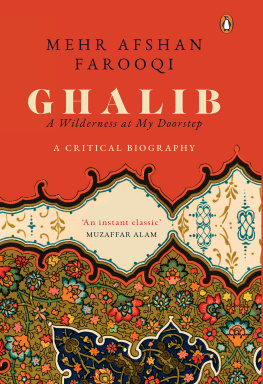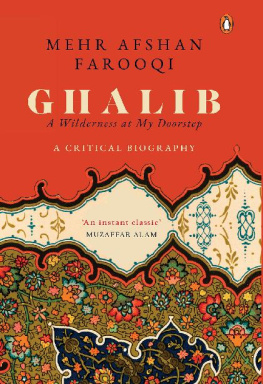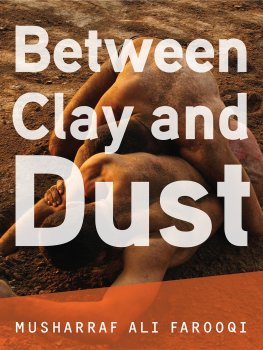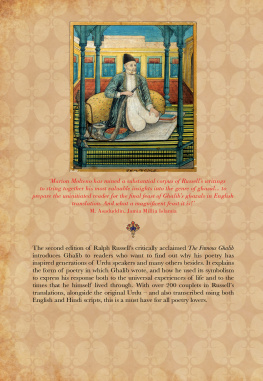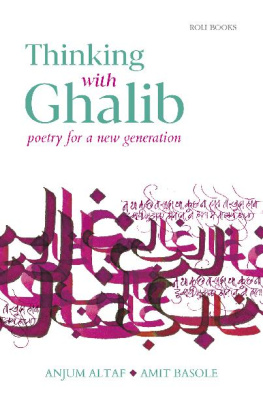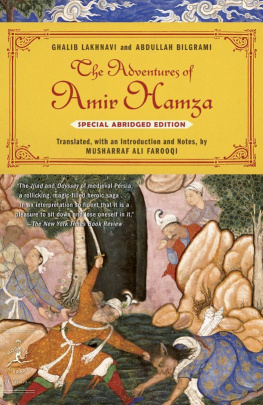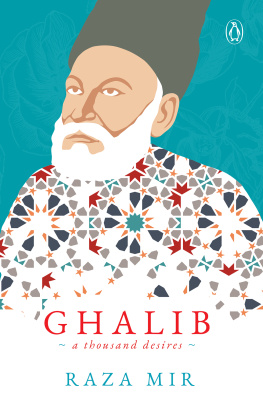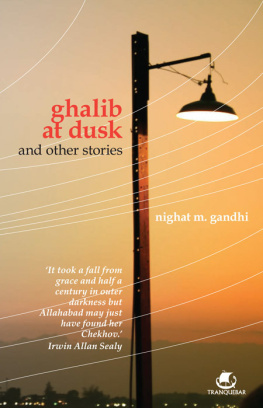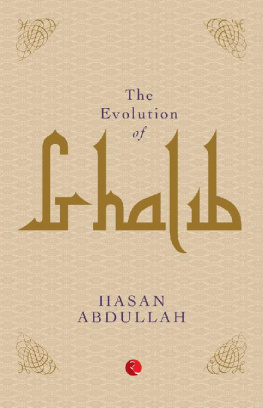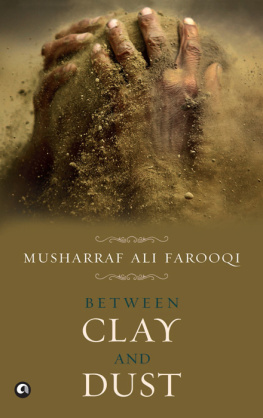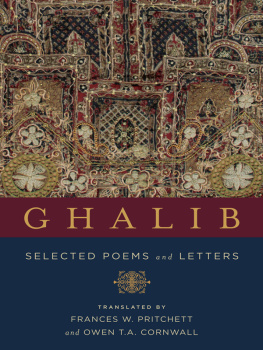Mehr Afshan Farooqi - Ghalib
Here you can read online Mehr Afshan Farooqi - Ghalib full text of the book (entire story) in english for free. Download pdf and epub, get meaning, cover and reviews about this ebook. year: 2021, publisher: Penguin Random House India Private Limited, genre: Detective and thriller. Description of the work, (preface) as well as reviews are available. Best literature library LitArk.com created for fans of good reading and offers a wide selection of genres:
Romance novel
Science fiction
Adventure
Detective
Science
History
Home and family
Prose
Art
Politics
Computer
Non-fiction
Religion
Business
Children
Humor
Choose a favorite category and find really read worthwhile books. Enjoy immersion in the world of imagination, feel the emotions of the characters or learn something new for yourself, make an fascinating discovery.
- Book:Ghalib
- Author:
- Publisher:Penguin Random House India Private Limited
- Genre:
- Year:2021
- Rating:5 / 5
- Favourites:Add to favourites
- Your mark:
- 100
- 1
- 2
- 3
- 4
- 5
Ghalib: summary, description and annotation
We offer to read an annotation, description, summary or preface (depends on what the author of the book "Ghalib" wrote himself). If you haven't found the necessary information about the book — write in the comments, we will try to find it.
Ghalib — read online for free the complete book (whole text) full work
Below is the text of the book, divided by pages. System saving the place of the last page read, allows you to conveniently read the book "Ghalib" online for free, without having to search again every time where you left off. Put a bookmark, and you can go to the page where you finished reading at any time.
Font size:
Interval:
Bookmark:




PENGUIN BOOKS

PENGUIN BOOKS
To Fran Pritchett,
The first woman commentator on Ghalib.
With love and admiration.
1750s: Ghalibs grandfather, Mirza Quqan Beg Khan, comes to India from Samarqand, settles in Lahore
Mid-1754: Mirza Quqan Beg Khan moves to Delhi
Mid-1756: He takes up service with Prince Shah Alam
1763 (approx.): Mirza Quqan Beg Khan marries
1765: Ghalibs father, Abdullah Beg Khan, is born in Delhi
176780: Five more children are born to Mirza Quqan Beg Khan, including Ghalibs uncle, Nasrullah Beg Khan
Mid-1771: Mirza Quqan Beg Khan takes up service with Zulfiqar ud-Daulah
1782 (approx.): Mirza Quqan Beg Khan takes up service with the Maharaja of Jaipur and settles in Agra
Mid-1778: Mirza Quqan Beg Khan dies
1793 (approx.): Ghalibs father, Abdullah Beg Khan, marries Izzatun Nisa Begam. Getting married at the age of twenty-eight seems unusual for the men at the time. Perhaps they were married earlier
1795 or earlier: Abdullah Beg Khans first child, Chhoti Khanam, Ghalibs sister, is born
Before 21 September 1797: Abdullah Beg Khan takes up service with Navab Asif ud-Daulah in Lucknow
21 September 1797: Navab Asif ud-Daulah dies
27 December 1797: Asadullah Khan is born in Agra (or maybe a couple of years earlier). The first instance of his date of birth is recorded in the 1837 manuscript of Divan-e Farsi. The divan (collection of poetry) of 1837 includes a qasidah-e manqibat (an ode in praise of the Prophets companions and descendants) in honour of Hazrat Imam Husain. The manqibat has a section in which Ghalib eloquently describes the conjugation of stars that have dealt him misfortunes. A subsequent version of this divan, prepared in 1848, has Ghalibs horoscope, in his own hand, attached with the manqibat. The horoscope mentions that Ghalib was born four hours before sunrise on Sunday evening (yak shambah), 8th of Rajab, 1212 hijri. But 8th of Rajab, 1212 hijri was not a Sunday; it was a Wednesday (chaharshambah)
Late 1799: Ghalibs younger brother, Yusuf Ali Khan (also known as Mirza Yusuf), is born
Before 1802: Abdullah Beg Khan takes up service with the maharajah of Alwar
1801/2: Abdullah Beg Khan dies, buried at Rajgarh in Alwar; his younger brother, Nasrullah Beg Khan, takes guardianship of his children. Nasrullah Beg Khan was married to the sister of Ahmad Bakhsh Khan, the Navab of Firozpur-Jhirka and Loharu (the date of the marriage is unknown)
1803: Nasrullah Beg Khan is the commander of Agra Fort, under the Marathas
1803: Nasrullah Beg Khan changes sides, joins Lord Lake; is appointed the commander of 400 cavalry at a salary of Rs 1700 per month
April 1806: Nasrullah Beg Khan dies after falling off an elephant
4 May 1806: His family, i.e. Nasrullah Beg Khans mother and three sisters, and Ghalib and his sister and brother, are granted a pension of Rs 10,000 annually, to be paid from the revenues of Ahmad Bakhsh Khans estate (who was probably granted some of Nasrullah Beg Khans property)
7 June 1806: The grant is reduced by Ahmad Bakhsh Khan to Rs 5000; half of this is granted to Khwaja Haji, a dependent of Nasrullah Beg Khan. Khwaja Haji was married to the daughter of Nasrullah Beg Khans paternal aunt (Ghalibs fathers phuphi). Khwaja Haji is entrusted with the command of fifty horsemen
180708 (approx.): Nazir Akbarabadi is alleged (probably not accurately) to have been Ghalibs tutor for some time during this period; Ghalib begins writing poetry, using Asad as his pen name. His famous short masnavi (a long poem written in rhyming couplets) about kite-flying has been attributed by Hali to this period
1810: Ghalib is said to attend the maktab (elementary school) of Maulvi Muhammad Muazzam, Agra
18/19 August 1810: Ghalib is married in Delhi to Umrao Begam (age eleven), daughter of Navab Ilahi Bakhsh Khan Maruf, the younger brother of Navab Ahmad Bakhsh Khan of Firozpur-Jhirka and Loharu; none of the seven children they have live beyond infancy
1811: Hurmuzd (Abdus Samad) allegedly (though perhaps not in reality) arrives from Iran, stays for two years as Ghalibs Persian tutor and teaches him the Persian of a native speaker
1812/3: Ghalib moves to Delhi permanently; he lives for a while with his father-in-law, then moves to a rented house in Gali Qasim Jan
c. 1816: Ghalib compiles his first Urdu divan, its only extant copy is in his own handwriting. The original manuscript surfaced in Bhopal in 1969; printed facsimile editions of it were producedone by Akbar Ali Khan Arshizadah (Rampur, 1969) and another by Nisar Ahmad Faruqi (Lahore, 1969). The manuscript disappeared under mysterious circumstances in 1970 and resurfaced under equally mysterious circumstances in 2016. It has now been digitized by the Ghalib Institute, New Delhi
1816: Ghalib adopts Ghalib as his takhallus (pen name), in addition to Asad
1821 (approx.): Ghalib compiles the second version of his Urdu divan, which is commonly known as Nuskhah-e Hamidiyyah. This manuscript was found in Bhopal in 1917. First printed in 1921, it was edited by Mufti Anvar ul-Haq of Bhopal with the famous unfinished preface by Abdur Rahman Bijnori; and again, much later, it was unearthed from Lahore in 1969, edited by Hamid Ahmad Khan. The original, reported to have disappeared from the State Library in Bhopal in 1947, resurfaced for sale with an art dealer in London in 2015. Nuskhah-e Hamidiyyah, bought by Shahab Sattar, was digitized and published in 2016.
1822: Navab Ahmad Bakhsh Khan appoints his eldest son, Navab Shamsuddin Ahmad Khan, as his heir and the manager of his jagir (land grant). Ghalibs relations with the latter were strained both for political and personal reasons
1825/26: Ghalib compiles the third version of his Urdu divan, which is now known as Nuskhah-e Sherani; this manuscript, discovered by Hafiz Mahmud Sherani, is now in Punjab University, Lahore. It was published by the university in a facsimile edition (1969). This version contains most (though not all) of the ghazals from 1821, and many new ones.
1825: Khwaja Haji dies; Ghalib begins seeking restoration of the full pension; he goes to Firozpur-Jhirka to talk with Navab Ahmad Bakhsh Khan and General Ochterlony
November 1825: Ghalib makes a second fruitless visit to Firozpur-Jhirka, hoping in vain to meet Ochterlonys successor, Charles Metcalf, the newly appointed Resident of Delhi, through Ahmad Bakhsh Khan and improve his pension situation; he goes to Bharatpur with Khan, is unsuccessful in meeting Metcalf, returns with Khan to Firozpur-Jhirka in December and stays till September 1826
August/December 1826: Ghalibs father-in-law, Navab Ilahi Bakhsh Khan Maruf, dies; Ghalibs younger brother, Mirza Yusuf, becomes insane around this time
Font size:
Interval:
Bookmark:
Similar books «Ghalib»
Look at similar books to Ghalib. We have selected literature similar in name and meaning in the hope of providing readers with more options to find new, interesting, not yet read works.
Discussion, reviews of the book Ghalib and just readers' own opinions. Leave your comments, write what you think about the work, its meaning or the main characters. Specify what exactly you liked and what you didn't like, and why you think so.

